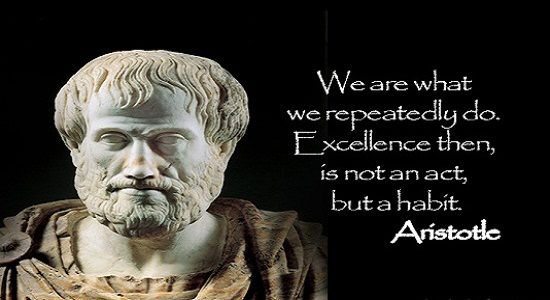Aristotle.
What could you, as a small business owner, learn from a dead Greek philosopher?
Lots actually.
Let me explain.
Firstly, it’s critical to know what copywriting is.
Copywriting is simply the writing of materials designed to persuade and sell. In short, it’s persuasive writing.
It could be on your website or blog; it could be for an advertisement you are going to place in your local newspaper; it could be for a radio ad you are going to run on your local radio station; it could be for a flyer or postcard you are going to hand out in local housing estates or industrial estates; it could be a “help wanted” notice for your business.
It’s self evident that the more effective and persuasive your words are, the more cost effective your advertising will be.
Aristotle’s Rhetoric-use logic and emotion
One of the earliest, and most successful, proponents of the art of persuasion was the Greek philosopher Aristotle.
Aristotle literally wrote the book on the art of persuasion-variously called “Rhetoric”, “the Art of Rhetoric”, or “Treatise on Rhetoric”. Rhetoricians regard Aristotle’s “Rhetoric” as the “most important single work on persuasion ever written.”
Much of what Aristotle had to say about persuasion is still evident and hard at work in good persuasive writing today-ethos (character, honesty, authority), logos (a plea or reason, logic, knowledge), and pathos (suffering, empathy, experience, an appeal to the emotions).
Powerfully persuasive writers understand that people buy on emotion and justify their purchase with logic.
Effective marketing material, blog posts, ads, flyers, brochures contain all of these elements, and more. This isn’t surprising because human motivations and dreams and desires haven’t changed all that much down through the centuries.
We all come into contact with copywriting every single day of our lives, whether we actually notice it or not.
And the best persuasive writing, also called “copy”, is not really noticeable.
“He should have gone to Specsavers”, “Just Do It”, and “Probably the best beer in the world” are three instantly recognisable phrases that have entered into everyday speech in many parts of the world.
All of these phrases were lovingly crafted by superb copywriters who may have spent days and weeks just crafting the headline or punch line for advertising/promotional campaigns which cost millions.
But which have reaped vastly rich rewards for the companies involved.
So at its essence, writing copy is the skill and art of writing words that move people to believe what it is the copywriter has to say, and moving them to the point of taking action.
And the copywriter will be seeking to persuade the reader that their life will be more complete or they will make more money or gain more prestige or cure a particular problem or avoid a particular fear or be loved or gain recognition/status or secure inner peace or better health or obtain more free time…or whatever.
The vast majority of purchasers make their decision based on emotion, not logic, and then rationalize or justify their decision by logic.
So the initial appeal of the copywriter will be to one or more of the reader’s basic human emotions.
The Benefit of A Good Copywriter
A good copywriter will utilize all the principles of persuasion firstly identified by Aristotle, exploited by giants of advertising like Claude Hopkins, Eugene Schwartz, David Oglivy, and elaborated upon more recently by academic Dr. Robert Cialdini in his seminal work, “Influence-The Psychology of Persuasion”.
He will also use attention grabbing headlines which will have you saying: “hey, he is talking to me”.
He will use desires, emotions, benefits, features, calls to action, guarantees, urgency, scarcity and various other tools of the persuasive trade.
If you are a small business owner, or you intend starting a small business you are in danger of making a huge mistake if you do not use the benefits of persuasive writing in your marketing/advertising materials and/or on your website.
To get started, take a look at the “About” page on your website.
Does this page make the most common mistake you will encounter with “About” pages all over the internet-a page focused not on the reader but on the writer and her achievements?
Does your “About” page answer the readers’ question: “what’s in it for me?”
Does it persuade the reader that you can help him?
Does your home page convince the reader that that she has landed in the right place in their online search?
Does it let your reader know that you are an authority in your area of expertise?
Does it give him a reason to contact you to make an enquiry or request a quotation or place an order?
Take a leaf from Aristotle’s book and employ the powerful weapons of emotion and logic.
